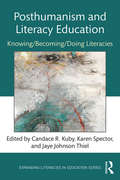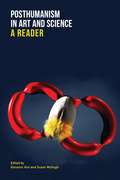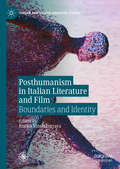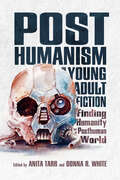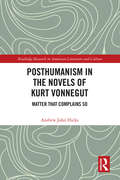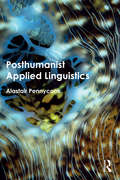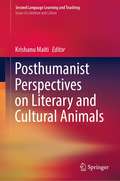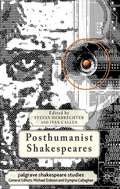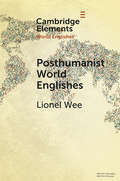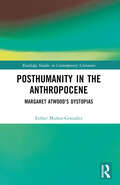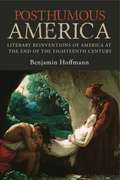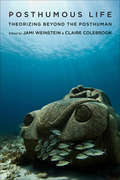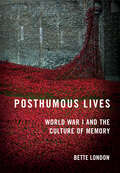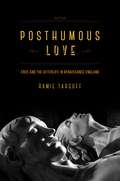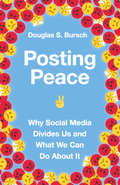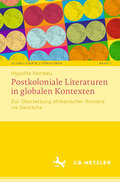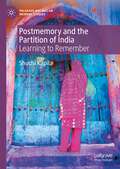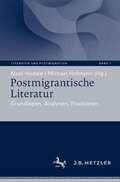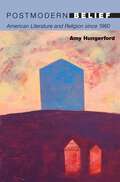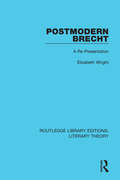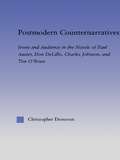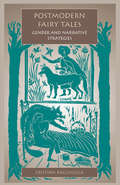- Table View
- List View
Posthumanism and Literacy Education: Knowing/Becoming/Doing Literacies (Expanding Literacies in Education)
by Candace R. Kuby Karen Spector Jaye Johnson ThielCovering key terms and concepts in the emerging field of posthumanism and literacy education, this volume investigates posthumanism, not as a lofty theory, but as a materialized way of knowing/becoming/doing the world. The contributors explore the ways that posthumanism helps educators better understand how students, families, and communities come to know/become/do literacies with other humans and nonhumans. Illustrative examples show how posthumanist theories are put to work in and out of school spaces as pedagogies and methodologies in literacy education. With contributions from a range of scholars, from emerging to established, and from both U.S. and international settings, the volume covers literacy practices from pre-K to adult literacy across various contexts. Chapter authors not only wrestle with methodological tensions in doing posthumanist research, but also situate it within pedagogies of teaching literacies. Inviting readers to pause, slow down, and consider posthumanist ways of thinking about agency, intra-activity, subjectivity, and affect, this book explores and experiments with new ways of seeing, understanding, and defining literacies, and allows readers to experience and intra-act with the book in ways more traditional (re)presentations do not.
Posthumanism in Art and Science: A Reader
by Aloi, Giovanni; McHugh, SusanPosthumanism synthesizes philosophical, literary, and artistic responses to technological advancements, globalization, and mass extinction in the Anthropocene. It asks what it can mean to be human in an increasingly more-than-human world that has lost faith in the ideal of humanism, the autonomous, rational subject, and it models generative alternatives cognizant of the demands of social and ecological justice. Amid rising social justice movements, collapsing economic structures, and the dwindling power of cultural institutions, posthumanism advances thinking on new and previously unenvisionable challenges.Posthumanism in Art and Science is an anthology of indispensable statements and artworks that provide an unprecedented mapping of this intellectual and aesthetic development in a global context. It features groundbreaking theorists including Donna Haraway, Rosi Braidotti, Mel Y. Chen, Michael Marder, Alexander Weheliye, Anna Tsing, Timothy Morton, N. Katherine Hayles, Bruno Latour, Francesca Ferrando, and Cary Wolfe, as well as innovative, influential artists and curators such as Yvonne Rainer, Skawennati, Chus Martínez, William Wegman, Nandipha Mntambo, Cassils, Pauline Oliveros, and Doo-sung Yoo. These provocative and compelling works, including previously unpublished interviews and essays, speak to the ongoing conceptual and political challenge of posthumanist thinking in a time of unprecedented cultural and environmental crises.An essential primer and reference for educators, students, artists, and art enthusiasts, this volume offers a powerful framework for rethinking anthropocentric certitudes and reenvisioning equitable and sustainable futures.
Posthumanism in Italian Literature and Film: Boundaries and Identity (Italian and Italian American Studies)
by Enrica Maria FerraraAs humans re-negotiate their boundaries with the nonhuman world of animals,inanimate entities and technological artefacts, new identities are formed and anew epistemological and ethical approach to reality is needed. Through twelvethought-provoking, scholarly essays, this volume analyzes works by a range ofmodern and contemporary Italian authors, from Giacomo Leopardi to ElenaFerrante, who have captured the shift from anthropocentrism and postmodernismto posthumanism. Indeed, this is the first academic volume investigating narrativeconfigurations of posthuman identity in Italian literature and film.
Posthumanism in Young Adult Fiction: Finding Humanity in a Posthuman World (Children's Literature Association Series)
by Anita Tarr and Donna R. WhiteContributions by Torsten Caeners, Phoebe Chen, Mathieu Donner, Shannon Hervey, Angela S. Insenga, Patricia Kennon, Maryna Matlock, Ferne Merrylees, Lars Schmeink, Anita Tarr, Tony M. Vinci, and Donna R. White For centuries, humanism has provided a paradigm for what it means to be human: a rational, unique, unified, universal, autonomous being. Recently, however, a new philosophical approach, posthumanism, has questioned these assumptions, asserting that being human is not a fixed state but one always dynamic and evolving. Restrictive boundaries are no longer in play, and we do not define who we are by delineating what we are not (animal, machine, monster). There is no one aspect that makes a being human—self-awareness, emotion, artistic expression, or problem-solving—since human characteristics reside in other species along with shared DNA. Instead, posthumanism looks at the ways our bodies, intelligence, and behavior connect and interact with the environment, technology, and other species. In Posthumanism in Young Adult Fiction: Finding Humanity in a Posthuman World, editors Anita Tarr and Donna R. White collect twelve essays that explore this new discipline's relevance in young adult literature. Adolescents often tangle with many issues raised by posthumanist theory, such as body issues. The in-betweenness of adolescence makes stories for young adults ripe for posthumanist study. Contributors to the volume explore ideas of posthumanism, including democratization of power, body enhancements, hybridity, multiplicity/plurality, and the environment, by analyzing recent works for young adults, including award-winners like Paolo Bacigalupi's Ship Breaker and Nancy Farmer's The House of the Scorpion, as well as the works of Octavia Butler and China Miéville.
Posthumanism in the Novels of Kurt Vonnegut: Matter That Complains So (Routledge Research in American Literature and Culture)
by Andrew HicksPosthumanism in the Novels of Kurt Vonnegut: Matter That Complains So re-examines the prevailing critical consensus that Kurt Vonnegut was a humanist writer. While more difficult elements of his work have often been the subject of scholarly attention, the tendency amongst critics writing on Vonnegut is to disavow them, or to subsume them within a liberal humanist framework. When Vonnegut’s work is read from a posthumanist perspective, however, the productive paradoxes of his work are more fully realised. Drawing on New Materialist, Eco-Critical and Systems Theory methodologies, this book highlights posthumanist themes in six of Vonnegut’s most famous novels, and emphasises the ways in which Vonnegut troubles human/non-human, natural/artificial, and material/discursive hierarchical binaries
Posthumanist Applied Linguistics
by Alastair PennycookDrawing on a range of contexts and data sources, from urban multilingualism to studies of animal communication, Posthumanist Applied Linguistics offers us alternative ways of thinking about the human predicament, with major implications for research, education and politics. Exploring the advent of the Anthropocene, new forms of materialism, distributed language, assemblages, and the boundaries between humans, other animals and objects, eight incisive chapters by one of the world's foremost applied linguistics open up profound questions to do with language and the world. This critical posthumanist applied linguistic perspective is essential reading for all researchers and students in the fields of Applied Linguistics and Sociolinguistics.
Posthumanist Perspectives on Literary and Cultural Animals (Second Language Learning and Teaching)
by Krishanu MaitiThis book offers Posthumanist readings of animal-centric literary and cultural texts. The contributors put the precepts and premises of humanism into question by seriously considering the animal presence in texts. The essays collected here focus primarily on literary and cultural texts from varied theoretically informed interdisciplinary perspectives advanced by critical approaches such as Critical Animal Studies and Posthumanism. Contributors select texts that cut across geographical and period boundaries and demonstrate how practices of close reading give rise to new ways of thinking about animals. By implicating the “animal turn” in the field of literary and cultural studies, this book urges us to problematize the separation of the human from other animals and rethink the hierarchical order of beings through close readings of select texts. It offers fresh perspectives on Posthumanist theory, inviting readers to revisit those criteria that created species’ difference from the early ages of human civilization. This book constitutes a rich and thorough scholarly resource on the politics of representation of animals in literature and culture. The essays in this book are empirically and theoretically informed and explore a range of dynamic, captivating, and highly relevant topics. Comprising over 15 chapters by a team of international contributors, this book is divided into four parts:Contestation over Species Hierarchy and CategorizationAnimal (Re)constructionsInterspecies RelationalitiesIntersectionality- Animal and GenderThis book will be essential reading for students and researchers of Critical Animal Studies and Environmental Studies.
Posthumanist Shakespeares
by Stefan HerbrechterShakespeare scholars and cultural theorists critically investigate the relationship between early modern culture and contemporary political and technological changes concerning the idea of the 'human. ' The volume covers the tragedies King Lear and Hamlet in particular, but also provides posthumanist readings of other Shakespearean plays.
Posthumanist World Englishes (Elements in World Englishes)
by Lionel WeeA posthumanist approach problematizes the separateness and centrality of humans in understanding the world around us. Posthumanism does not deny the role of humans but questions the assumption that it is human activity and agency that should be given pride of place in any analysis of social activity. This carries important and interesting implications for the study of World Englishes, some of which are explored in this Element. Sections 3 and 4, respectively, explore posthumanism in relation to two specific topics in World Englishes, creativity and language policy. These topics have been chosen because they allow us to see the contributions that posthumanism can make to a micro-level (creativity) as well as macro-level (language policy) topic.
Posthumanity in the Anthropocene: Margaret Atwood's Dystopias (Routledge Studies in Contemporary Literature)
by Esther Muñoz-GonzálezIn this book, Margaret Atwood’s dystopian novels—The Handmaid’s Tale, the MaddAddam trilogy, The Heart Goes Last, and The Testaments—are analyzed from the perspective provided by the combined views of the construction of the posthuman subject in its interactions with science and technology, and the Anthropocene as a cultural field of enquiry. Posthumanist critical concerns try to dismantle anthropocentric notions of the human and defend the need for a closer relationship between humanity and the environment. Supported by the exemplification of the generic characteristics of the cli-fi genre, this book discusses the effects of climate change, at the individual level, and as a collective threat that can lead to a "world without us." Moreover, Margaret Atwood is herself the constant object of extensive academic interest and Posthuman theory is widely taught, researched, and explored in almost every intellectual field. This book is aimed at worldwide readers, not only those interested in Margaret Atwood’s oeuvre, but also those interested in the debate between critical posthumanism and transhumanism, together with the ethical implications of living in the Anthropocene era regarding our daily lives and practices. It will be especially attractive for academics: university teachers, postgraduates, researchers, and college students in general.
Posthumanity in the Anthropocene: Margaret Atwood's Dystopias (Routledge Studies in Contemporary Literature)
by Esther Muñoz-GonzálezIn this book, Margaret Atwood’s dystopian novels—The Handmaid’s Tale, the MaddAddam trilogy, The Heart Goes Last, and The Testaments—are analyzed from the perspective provided by the combined views of the construction of the posthuman subject in its interactions with science and technology, and the Anthropocene as a cultural field of enquiry. Posthumanist critical concerns try to dismantle anthropocentric notions of the human and defend the need for a closer relationship between humanity and the environment. Supported by the exemplification of the generic characteristics of the cli-fi genre, this book discusses the effects of climate change, at the individual level, and as a collective threat that can lead to a "world without us." Moreover, Margaret Atwood is herself the constant object of extensive academic interest and Posthuman theory is widely taught, researched, and explored in almost every intellectual field. This book is aimed at worldwide readers, not only those interested in Margaret Atwood’s oeuvre, but also those interested in the debate between critical posthumanism and transhumanism, together with the ethical implications of living in the Anthropocene era regarding our daily lives and practices. It will be especially attractive for academics: university teachers, postgraduates, researchers, and college students in general.
Posthumous America: Literary Reinventions of America at the End of the Eighteenth Century
by Benjamin Hoffmann Alan J. SingermanBenjamin Hoffmann’s Posthumous America examines the literary idealization of a lost American past in the works of French writers of the eighteenth and nineteenth centuries. For writers such as John Hector St. John de Crèvecœur and Claude-François de Lezay-Marnésia, America was never more potent as a driving ideal than in its loss. Examining the paradoxical American paradise depicted in Crèvecœur’s Lettres d’un cultivateur américain (1784); the “uchronotopia”—the imaginary perfect society set in America and based on what France might have become without the Revolution—of Lezay-Marnésia’s Lettres écrites des rives de l’Ohio (1792); and the political and nationalistic motivations behind François-René Chateaubriand’s idealization of America in Voyage en Amérique (1827) and Mémoires d’outre-tombe (1850), Hoffmann shows how the authors’ liberties with the truth helped create the idealized and nostalgic representation of America that dominated the collective European consciousness of their times. From a historical perspective, Posthumous America works to determine when exactly these writers stopped transcribing what they actually observed in America and started giving imaginary accounts of their experiences.A vital contribution to transatlantic studies, this detailed exploration of French perspectives on the colonial era, the War of Independence, and the birth of the American Republic sheds new light on the French fascination with America. Posthumous America will be invaluable for historians, political scientists, and specialists of literature whose scholarship looks at America through European eyes.
Posthumous Life: Theorizing Beyond the Posthuman (Critical Life Studies)
by Claire Colebrook Jami WeinsteinPosthumous Life launches critical life studies: a mode of inquiry that neither endorses nor dismisses a wave of recent "turns" toward life, matter, vitality, inhumanity, animality, and the real. Questioning the nature and limits of life in the natural sciences, the essays in this volume examine the boundaries and significance of the human and the humanities in the wake of various redefinitions of what counts as life. They explore the possibility of theorizing life without assuming it to be either a simple substrate or an always-mediated effect of culture and difference. Posthumous Life provides new ways of thinking about animals, plants, humans, difference, sexuality, race, gender, identity, the earth, and the future.
Posthumous Lives: World War I and the Culture of Memory
by Bette LondonPosthumous Lives explores the shifting significance of public and private efforts to commemorate British soldiers killed in World War I—as well as the less well-remembered casualties of the war, including Voluntary Aid Detachments, nurses, conscientious objectors, civilians, and soldiers executed for desertion or cowardice—and the compelling hold the First World War has had on the British imagination for more than a century. By using the concept of the posthumous life—the attempt to extend the presence of the dead into the lives of the living—Bette London demonstrates how this idea came to shape Britain's First World War memory practices and rituals.London draws on a diverse range of source materials—from sentimental memorabilia books commissioned by bereaved families and canonical works of literature and art by Virginia Woolf, Wilfred Owen, and Sir Edwin Lutyens to centenary memorials and commemorative art installations—to uncover the surprising connections between memorialization practices, war writing, and modernism. Spanning the century from the middle of World War I to its centenary celebrations, Posthumous Lives illuminates, in a deeply moving narrative, how the dead are remembered to meet the shifting needs of the living.
Posthumous Love: Eros and the Afterlife in Renaissance England
by Ramie TargoffFor Dante and Petrarch, posthumous love was a powerful conviction. Like many of their contemporaries, both poets envisioned their encounters with their beloved in heaven—Dante with Beatrice, Petrarch with Laura. But as Ramie Targoff reveals in this elegant study, English love poetry of the Renaissance brought a startling reversal of this tradition: human love became definitively mortal. Exploring the boundaries that Renaissance English poets drew between earthly and heavenly existence, Targoff seeks to understand this shift and its consequences for English poetry. Targoff shows that medieval notions of the somewhat flexible boundaries between love in this world and in the next were hardened by Protestant reformers, who envisioned a total break between the two. Tracing the narrative of this rupture, she focuses on central episodes in poetic history in which poets developed rich and compelling compensations for the lack of posthumous love—from Thomas Wyatt’s translations of Petrarch’s love sonnets and the Elizabethan sonnet series of Shakespeare and Spencer to the carpe diem poems of the seventeenth century. Targoff’s centerpiece is Romeo and Juliet, where she considers how Shakespeare’s reworking of the Italian story stripped away any expectation that the doomed teenagers would reunite in heaven. Casting new light on these familiar works of poetry and drama, this book ultimately demonstrates that the negation of posthumous love brought forth a new mode of poetics that derived its emotional and aesthetic power from its insistence upon love’s mortal limits.
Posting Peace: Why Social Media Divides Us and What We Can Do About It
by Douglas S. BurschWhy is everyone so angry online? The internet seems to have brought the world together only so we can tear each other apart. Social media platforms have become toxic and polarizing environments. Many of us are overwhelmed and disillusioned by endless online conflict and negativity. How did we get here, and what can we do about it? The internet changes not only how we communicate but also what we communicate. Pastor and former radio host Douglas Bursch provides a spiritual examination of why social media divides people and how Christians can address polarization through a ministry of peacemaking. Digital media dehumanizes and disembodies us, dulling our ability to know when to speak and when to remain silent. But healthy online communication is possible through a constructive posture of reconciliation. Bursch offers practical examples of how to proactively manage social media and handle online conflict in redemptive ways. Together we can change the discourse of online Christian communication. Discover how we can use social media in a positive, Christ-like manner.
Postkoloniale Literaturen in globalen Kontexten: Zur Übersetzung afrikanischer Romane ins Deutsche (Globalisierte Literaturen. Theorie und Geschichte transnationaler Buchkultur / Globalized Literatures. Theory and History of Transnational Book Culture #7)
by Hypolite KembeuFragen des Kulturtransfers und insbesondere des ideologischen Einflusses auf Übersetzungen bilden das Untersuchungsfeld des vorliegenden Buches. Es widmet sich der Rezeption afrikanischer Literaturen während und in der Folge des Kalten Krieges in Deutschland. Ausgehend von literatursoziologischen und postkolonialen Übersetzungstheorien und damit verbundenen analytischen Ansätzen geht der Autor anhand von Rezeptionsprozessen und Übersetzungen den konkreten Strategien der Rekontextualisierung von postkolonialen afrikanischen Literaturen nach. Dabei werden auch die unterschiedlichen sozialhistorischen und -politischen Faktoren in der BRD und DDR sowie nach der Wiedervereinigung betrachtet. Diese kontextualisierte Untersuchung der Literaturrezeption erfolgt anhand der Werke vieler afrikanischer Autoren, insbesondere des Kameruners Ferdinand Oyono, des Kenianers Ngũgĩ Wa Thiong’o, des Nigerianers Chinua Achebe und des Ivorers Ahmadou Kourouma. Die Analyse zeigt, dass das Idealbild vom ideologiefreien Kulturtransfer der Realität nicht standhält, da die Übersetzung, sei es bei der Auswahl der zu übersetzenden Texte oder auch bei den Übersetzungsstrategien der ausnahmslos europäischen Übersetzer, sich als ein gesellschaftsbezogenes und ideologisch geprägtes Konstrukt herausstellt. Die für das Übersetzen oft postulierte interkulturelle Kommunikation und internationale Partnerschaft weist demnach ein bedeutendes asymmetrisches Machtverhältnis zwischen Zivilisationen auf, dessen Ursache nicht sprachlicher, literarischer oder künstlerischer, sondern eher geopolitischer Natur ist.
Postmemory and the Partition of India: Learning to Remember (Palgrave Macmillan Memory Studies)
by Shuchi KapilaThis book examines the memories of the Partition of India in 1947 with a focus on the generation of postmemory (those who came after it) and how partition experiences have been shared (or not) and understood. It explores the formal and narrative properties of different memory practices that have been built around the partition, and the methods of oral historians involved in collecting testimonies as part of the 1947 Berkeley partition archive.
Postmigrantische Literatur: Grundlagen, Analysen, Positionen (Literatur und Postmigration #1)
by Michael Hofmann Nazli HodaieAnders als der herkömmliche Migrationsdiskurs strebt das postmigrantische Paradigma eine gegenhegemoniale Wissensproduktion an mit dem Fokus, Migration neu zu erzählen und statisch-binäre Kategorien der (Nicht-)Zugehörigkeit zugunsten migrationsgesellschaftlicher Uneindeutigkeiten und Hybriditäten in Frage zu stellen. Vor diesem Hintergrund setzt sich der Band zum Ziel, das Postmigrantische als Analyseparadigma sowie ästhetisches Gestaltungsprinzip in die literaturwissenschaftliche Diskussion einzuführen und mit Blick auf Literaturproduktion, -rezeption und -kritik für ästhetisch-hegemoniekritische Auseinandersetzungen fruchtbar zu machen.
Postmodern Belief: American Literature and Religion since 1960 (20/21)
by Amy HungerfordHow can intense religious beliefs coexist with pluralism in America today? Examining the role of the religious imagination in contemporary religious practice and in some of the best-known works of American literature from the past fifty years, Postmodern Belief shows how belief for its own sake--a belief absent of doctrine--has become an answer to pluralism in a secular age. Amy Hungerford reveals how imaginative literature and religious practices together allow novelists, poets, and critics to express the formal elements of language in transcendent terms, conferring upon words a religious value independent of meaning. Hungerford explores the work of major American writers, including Allen Ginsberg, Don DeLillo, Cormac McCarthy, Toni Morrison, and Marilynne Robinson, and links their unique visions to the religious worlds they touch. She illustrates how Ginsberg's chant-infused 1960s poetry echoes the tongue-speaking of Charismatic Christians, how DeLillo reimagines the novel and the Latin Mass, why McCarthy's prose imitates the Bible, and why Morrison's fiction needs the supernatural. Uncovering how literature and religion conceive of a world where religious belief can escape confrontations with other worldviews, Hungerford corrects recent efforts to discard the importance of belief in understanding religious life, and argues that belief in belief itself can transform secular reading and writing into a religious act. Honoring the ways in which people talk about and practice religion, Postmodern Belief highlights the claims of the religious imagination in twentieth-century American culture.
Postmodern Brecht: A Re-Presentation (Routledge Library Editions: Literary Theory #27)
by Elizabeth WrightIn this radical and deliberately controversial re-reading of Brecht, first published in 1989, Elizabeth Wright takes a new view of the playwright, giving us a more ‘Brechtian’ reading than so far achieved and making his work historically relevant here and now. The author discusses in detail Brecht’s principle theories and concepts in the light of poststructuralist theory, and reassess the aesthetics and politics with regard to Marxist critics of his own day. Wright includes a re-reading of Brecht’s early works, which presents them in relation to a postmodern theatre, and gives critical analyses of the work of Pina Bausch, Robert Wilson, and Heiner Müller, who use the techniques of performance theatre, showing how they deconstruct Brecht’s distinction between illusion and reality and point to a postmodern understanding of their dialectical relation.
Postmodern Brecht: A Re-Presentation (Routledge Library Editions: Literary Theory)
by Elizabeth WrightIn this radical and deliberately controversial re-reading of Brecht, first published in 1989, Elizabeth Wright takes a new view of the playwright, giving us a more ‘Brechtian’ reading than so far achieved and making his work historically relevant here and now. The author discusses in detail Brecht’s principle theories and concepts in the light of poststructuralist theory, and reassess the aesthetics and politics with regard to Marxist critics of his own day. Wright includes a re-reading of Brecht’s early works, which presents them in relation to a postmodern theatre, and gives critical analyses of the work of Pina Bausch, Robert Wilson, and Heiner Müller, who use the techniques of performance theatre, showing how they deconstruct Brecht’s distinction between illusion and reality and point to a postmodern understanding of their dialectical relation.
Postmodern Counternarratives: Irony and Audience in the Novels of Paul Auster, Don DeLillo, Charles Johnson, and Tim O'Brien (Literary Criticism and Cultural Theory)
by Christopher DonovanThis book provides a wide-ranging discussion of realism, postmodernism, literary theory and popular fiction before focusing on the careers of four prominent novelists. Despite wildly contrasting ambitions and agendas, all four grow progressively more sympathetic to the expectations of a mainstream literary audience, noting the increasingly neglected yet archetypal need for strong explanatory narrative even while remaining wary of its limitations, presumptions, and potential abuses. Exploring novels that manage to bridge the gap between accessible storytelling and literary theory, this book shows how contemporary authors reconcile values of posmodern literary experimentation and traditional realism.
Postmodern Fairy Tales
by Cristina BacchilegaPostmodern Fairy Tales seeks to understand the fairy tale not as children's literature but within the broader context of folklore and literary studies. It focuses on the narrative strategies through which women are portrayed in four classic stories: "Snow White," "Little Red Riding Hood," "Beauty and the Beast," and "Bluebeard." Bacchilega traces the oral sources of each tale, offers a provocative interpretation of contemporary versions by Angela Carter, Robert Coover, Donald Barthelme, Margaret Atwood, and Tanith Lee, and explores the ways in which the tales are transformed in film, television, and musicals.
Postmodern Literature and Race
by Len Platt Sara UpstonePostmodernism and Race explores the question of how dramatic shifts in conceptions of race in the late twentieth and early twenty-first centuries have been addressed by writers at the cutting edge of equally dramatic transformations of literary form. An opening section engages with the broad question of how the geographical and political positioning of experimental writing informs its contribution to racial discourses, while later segments focus on central critical domains within this field: race and performativity, race and the contemporary nation, and postracial futures. With essays on a wide range of contemporary writers, including Bernadine Evaristo, Alasdair Grey, Jhumpa Lahiri, Andrea Levy, and Don DeLillo, this volume makes an important contribution to our understanding of the politics and aesthetics of contemporary writing.
